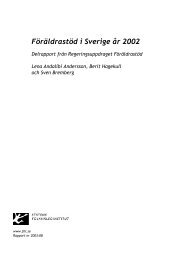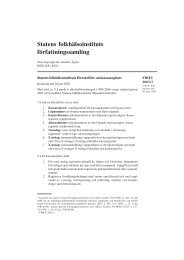Gambling motivation and involvement: A review of social
Gambling motivation and involvement: A review of social
Gambling motivation and involvement: A review of social
You also want an ePaper? Increase the reach of your titles
YUMPU automatically turns print PDFs into web optimized ePapers that Google loves.
In the research <strong>review</strong>ed, reasons for high <strong>involvement</strong> in gambling are in the<br />
forefront <strong>of</strong> the micro-sociological studies, especially those on gambling subcultures.<br />
These studies show how, for some individuals, gambling becomes a way <strong>of</strong> life.<br />
Such studies, as well as ethnographic studies more generally, also reveal situational<br />
rationalities peculiar to gambling environments, i.e. modes <strong>of</strong> thinking shaped by<br />
the contexts <strong>and</strong> environments <strong>of</strong> playing games that to an outside observer appear<br />
irrational <strong>and</strong> distorted. Such thinking <strong>and</strong> the resulting behaviors are direct risk<br />
factors for gambling problems.<br />
Two promising quantitative approaches that may complement problem gambling<br />
prevalence studies have been identified in the research <strong>review</strong>ed. One approach is<br />
the geographical analysis <strong>of</strong> gambling participation, which enables us to study the<br />
connection between availability <strong>of</strong> gambling <strong>and</strong> the extent <strong>of</strong> problem gambling.<br />
Another approach is the statistical study <strong>of</strong> betting slips, electronic databases <strong>of</strong><br />
online gambling behavior, <strong>and</strong> other hard evidence <strong>of</strong> how gamblers play. Such<br />
player tracking studies do not rely on self-report but on evidence <strong>of</strong> actual decisions<br />
made when gambling.<br />
Most <strong>of</strong> the comprehensive models <strong>of</strong> gambling behavior discussed integrate psychological<br />
factors with <strong>social</strong>, economic <strong>and</strong> cultural factors. While the <strong>motivation</strong>al<br />
models apply mostly to the leisure gambler, the <strong>involvement</strong> models account<br />
for problem gambling. The variety <strong>of</strong> such models tells us two things: first, that<br />
problem gambling is complex, which makes it necessary to include a great number<br />
<strong>of</strong> factors in the models – factors that researchers may define differently <strong>and</strong> consider<br />
to have different relations <strong>of</strong> causality; <strong>and</strong> second, that problem gambling<br />
research has varying objectives, where some research focuses on the individual <strong>and</strong><br />
other research focuses on the <strong>social</strong> contexts <strong>of</strong> gambling.<br />
Some <strong>of</strong> the qualitative approaches <strong>review</strong>ed are <strong>of</strong> little direct relevance to problem<br />
gambling studies: the cross-cultural, historic <strong>and</strong> cultural studies. Such research<br />
is, however, <strong>of</strong> indirect value, since it prompts us to reflect on gambling as a <strong>social</strong><br />
<strong>and</strong> cultural phenomenon. While the bulk <strong>of</strong> scientific discoveries <strong>and</strong> uncovering <strong>of</strong><br />
facts by empirical research is made by focusing on specific issues that are dissected<br />
in detail, scientific progress is more generally promoted by researchers occasionally<br />
taking a broader view on the subject <strong>of</strong> investigation.<br />
These broader views may spawn new ideas for research questions. One example,<br />
from this knowledge <strong>review</strong>, is whether problem gambling exists in non-commercial<br />
gambling on chance games <strong>and</strong> in skill games where gamblers are equally skilled.<br />
Another advantage <strong>of</strong> such broad views is that they highlight the <strong>social</strong> <strong>and</strong> cultural<br />
context <strong>of</strong> research. <strong>Gambling</strong> <strong>and</strong> problem gambling is conceptualized in different<br />
ways across historical periods <strong>and</strong> societies, <strong>and</strong> researchers should be aware <strong>of</strong><br />
how their activities relate to these conceptualizations. Scientists may feel that they<br />
work perfectly objectively <strong>and</strong> detached from moral <strong>and</strong> political contexts, but in<br />
reality all science is framed <strong>and</strong> influenced by society <strong>and</strong> culture at large; the fruits<br />
<strong>of</strong> research are not only scientific but also <strong>social</strong>.<br />
G A M B L I N G M O T I VAT I O N A N D I N V O LV E M E N T 67

















